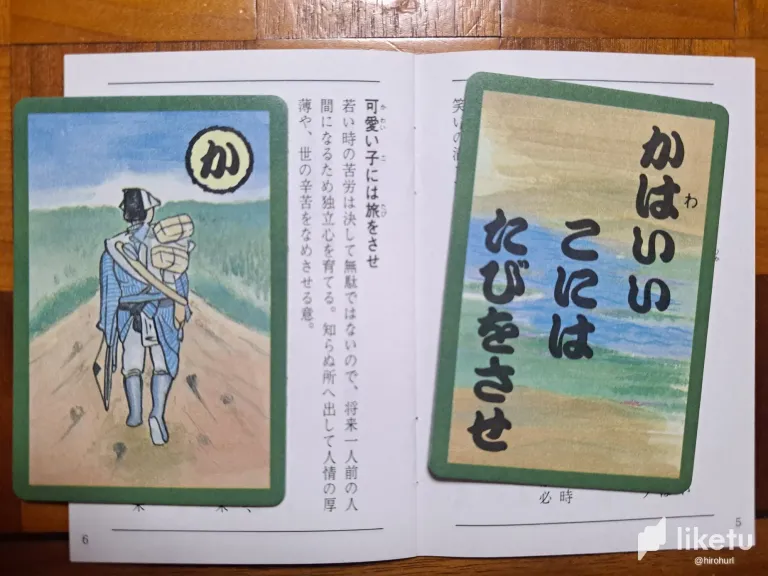Iroha Karuta 14.1: Send A Callow Youth Away On A Journey

The fourteenth syllable in the Iroha Karuta is "ka" and once again my two karuta decks offer different proverbs.
Today's proverb goes like this:
可愛い子には旅をさせ
Kawaii ko ni wa tabi wo sase
Okay, let's break it down into its constituent parts:
- 可愛い = Kawaii = cute
- 子 = ko = child
- に は = ni wa = "as for" the topic of this proverb, i.e. "As for the cute child..."
- 旅 = tabi = journey
- を = wo = object marker
- させ = sase = (imperative mood) make someone do something
My First Translation
I was able to bash out a quick literal translation, which went like this:
Send a cute child on a journey.
What does it mean?
I included in the photo the explanation that is in the booklet that came with this Iroha Karuta set. It goes like this:
若い時の苦労は決して無駄ではないので、将来 一人前の人間になるため独立心を育てる。知らぬ所へ出して人情の厚薄や、世の辛苦をなめさせる意。
"Struggles experienced in youth are never wasted; they foster independence and help one grow into a fully mature adult. The idea is to send your child to unfamiliar places, allowing him to experience the the depth and shallowness of human emotions, as well as the joys and hardships of the world."
In short, the idea is to send your child out into the world to gain experience of life.
My Final Translation
With that in mind, I felt that "cute child" was, well, a little too cutesy for the case. The child in question is a young and callow adult. With that in mind, I modified my translation like this:
Send a callow youth away on a journey.
I like the balance of this translation, and also that it has the same number of syllables (11) as the original Japanese proverb.
Okay, as I type this, I haven't put the challenge to ChatGPT or Google Translate, so let's see what they come up with:
The "ChatGPT" Translation
Send your beloved child on a journey.
I think "beloved" is an interesting take on "kawaii," which typically means "cute" in Japanese, but it is true that "kawaii" has a much broader and deeper range of connotations that the literal English equivalent "cute" does.
Okay, now let's see what Google Translate does with it...
The "Google Translate" Translation
Woah! Once again, Google Translate comes up with a compressed version that I quite like!
Let the cute ones travel
Five words, capturing the essence of the Japanese proverb with even fewer syllables!
In my next Iroha Karuta post, I will look at another proverb for "Ka," the one that my cheap "Daiso" (100 yen shop) deck features...
Until then, 気をつけてね!😉
David Hurley
#InspiredFocus
For the best experience view this post on Liketu